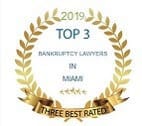Debtor and non-debtor spouse’s joint tax refund was exempt in bankruptcy
In the case of In re Uttermohlen, the U.S. Eleventh Circuit Court of Appeals upheld a bankruptcy court ruling that a joint tax refund belonging to the debtor and his non-debtor spouse, who had not filed bankruptcy, was exempt “tenancy-by-the-entireties” property that did not need to be included as part of the debtor’s Chapter 7 bankruptcy estate where the parties had no joint debts.
Tenancy by the entireties is a special kind of ownership right in property recognized in some states, including Florida, for married couples. Each spouse holds the whole or the entirety of the property, not a fractional share. Tenancy-by-the-entireties property has six requirements:
- Unity of interest-the interests of each spouse in the property must be identical.
- Unity of marriage-the parties must be married when the property became titled in their joint names.
- Unity of possession-joint ownership and control.
- Unity of title-the interests must have arisen from the same source.
- Unity of time-the interests must have commenced simultaneously.
- Right of survivorship.
Property that is held as tenants by the entireties is exempt from claims of creditors of only one spouse. Only when debts are owed by both spouses, jointly, may creditors attach tenancy-by-the-entireties property.
Background and procedural history
In 2010, the debtor filed an individual petition for relief under Chapter 7 of the Bankruptcy Code. The debtor’s bankruptcy schedules claimed an exemption for a joint 2010 federal income tax refund in the amount of $10,668. The debtor asserted that the tax refund was exempt tenancy-by-the-entireties property under the Florida law and the Bankruptcy Code.
The bankruptcy trustee objected to the claimed exemption, arguing that the non-filing spouse did not work outside the home, that the refund was attributable solely to the debtor’s personal income and his business income and losses, and that the refund was not tenancy-by-the-entireties property and should be apportioned based on the percentage share of each spouse’s income contributions.
The Bankruptcy Court concluded that all six requirements for tenancy-by-the-entireties were present when the debtor filed bankruptcy and the refund was “presumed” to be tenancy-by-the-entireties property. After the trustee failed to submit proof to rebut the presumption, the Bankruptcy Court overruled the trustee’s objection. The trustee appealed the ruling in the federal district court.
The District Court’s ruling
The district court upheld the bankruptcy court’s ruling. The district court noted that, under Florida law, there is a legal presumption that property owned by a husband and wife is held by them as tenancy by the entireties unless a contrary intent has been expressed by the parties.
The debtor and his non-filing spouse held an interest in the refund when the debtor’s bankruptcy petition was filed. The law presumed that the couple intended to possess that interest as tenancy-by-the-entireties property. They demonstrated this intent when they filed their tax return as a married couple filing jointly, which made them jointly accountable for any tax liability under the tax laws, and when their joint tax return requested a refund check in both of their names.
The court decided that the refund was exempt since there were no joint creditor claim against both spouses. The trustee filed an appeal in the Eleventh Circuit.
The Eleventh Circuit’s decision
The Eleventh Circuit summarily upheld the district court’s decision, stating that it was a “well-reasoned, thorough opinion.”
Contact an attorney
Individuals facing possible bankruptcy are urged to seek the advice of a competent attorney, experienced in such matters, in order ensure that their legal rights are protected.
















